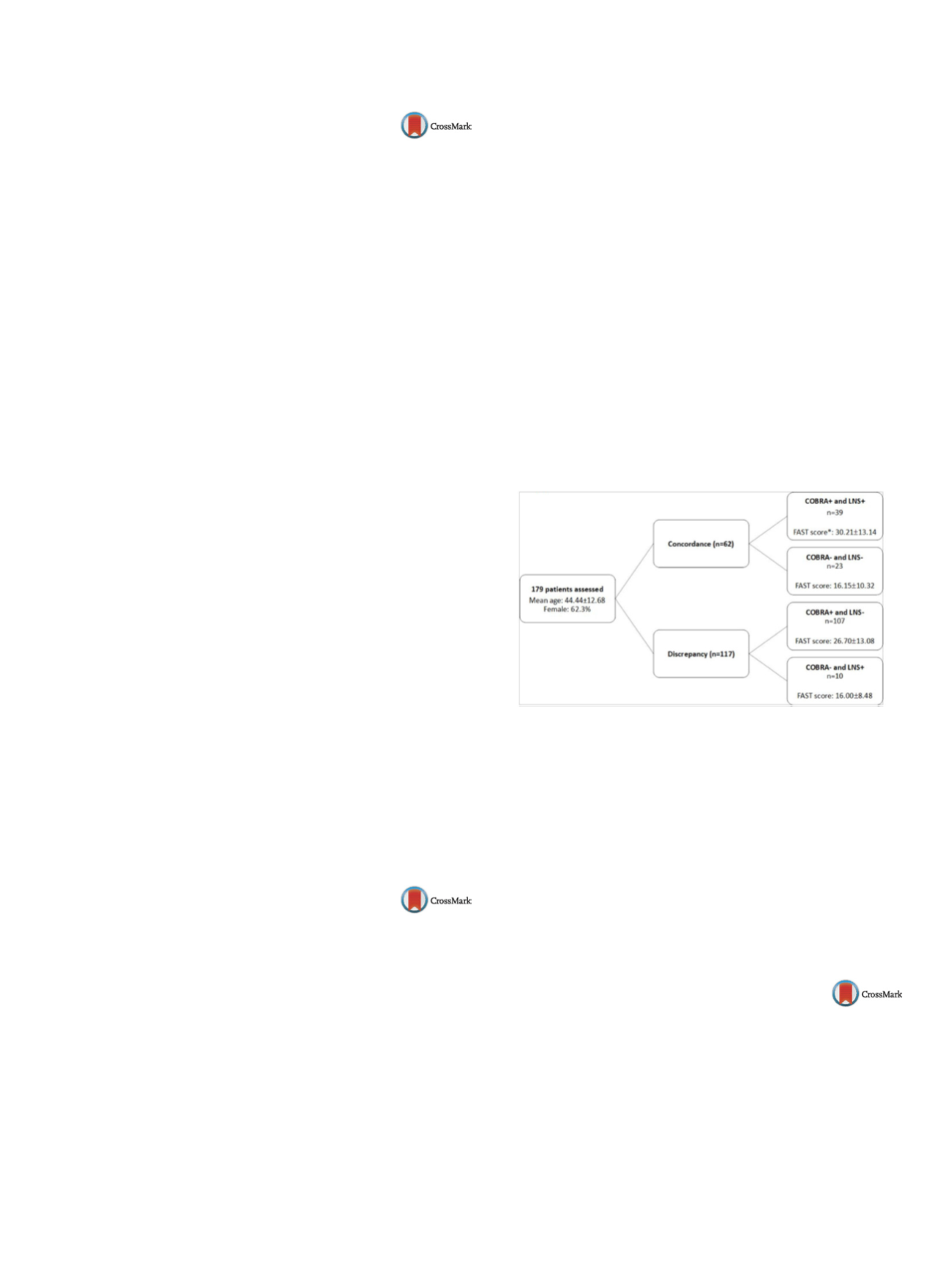

25th European Congress of Psychiatry / European Psychiatry 41S (2017) S170–S237
S207
EW0297
Bipolar disorder, obesity and
cognitive impairment
M. La Montagna
1 ,∗
, E. Stella
1, F. Ricci
1, L. Borraccino
1,
A.I. Triggiani
2, F. Panza
3, D. Seripa
3, G. Miscio
3, A. Bellomo
1,
M. Lozupone
11
University of Foggia, Department of Mental Health, Foggia, Italy
2
Laboratory of Physiology- University of Foggia, Department of
Clinical and Experimental Medicine, Foggia, Italy
3
IRCCS Casa Sollievo della Sofferenza, Department of Medical
Sciences, San Giovanni Rotondo, Italy
∗
Corresponding author.
Introduction
According to scientific literature, cognitive impair-
ment is a disabling feature of the bipolar disorder (BD), present in
all the phases of the disease. Obesity and metabolic disorders rep-
resent another risk factor for cognitive dysfunctions in BD, since
the excess of weight could adversely influence several cognitive
domains.
Objective
To highlight the presence of impairment of cognitive
functions in a sample of subjects suffering from BD and obesity.
Aims
Evaluation of the cognitive performance in a sample of BD
patients, considering their anthropometric measures (height and
weight) and body mass index (BMI).
Methods
The neuropsychological battery MATRICS Consensus
Cognitive Battery (MCCB) was administered by trained physi-
cians for the evaluation of seven different cognitive domains in
46 patients (mean age: 43.17 years old; 39.13% male), affected
by BD enrolled in the psychiatric unit of Azienda Sanitaria
Locale and University of Foggia. In particular, cognitive func-
tions assessed were speed of processing, attention/vigilance,
working memory, verbal learning, visual learning, reasoning
and problem solving, and social cognition. BMI was calculated,
and patients were divided into a group of normal weight and
another one of overweight or obese, on the base of BMI value
(BMI cut-off = 25).
Results
The obese patients amounted at 56.52%. We have found
the presence of cognitive deficits in two of the seven domains
assessed, that are speed of processing (
P
< 0.01) and reason-
ing and problem solving (
P
< 0.05) in the sample of overweight
patients.
Conclusions
Cognitive deficits are clearly revealed in BD patients
during the euthymic phase of the disorder. The obesity in BD could
contribute to increase dysfunctions in cognitive domains.
Disclosure of interest
The authors have not supplied their decla-
ration of competing interest.
http://dx.doi.org/10.1016/j.eurpsy.2017.01.2167EW0298
Concordance and discrepancy
between subjective and objective
cognitive assessment in bipolar
disorder: What is influencing this
discrepancy?
F. Lima
1 ,∗
, T. Cardoso
1, C. Bonnin
2, A. Martinez-Aran
2, E. Vieta
2,
A. Rosa
31
Universidade Federal do Rio Grande do Sul, Postgraduate Program
in Psychiatry and Behavioral Sciences, Porto Alegre, Brazil
2
University of Barcelona, Bipolar Disorders Program, Barcelona,
Spain
3
Universidade Federal do Rio Grande do Sul, Department of
Pharmacology, Porto Alegre, Brazil
∗
Corresponding author.
Introduction
Evidence has shown that some patientswith bipolar
disorder have a relatively accurate sense of their cognitive abili-
ties, whereas others may overreported or underreported cognitive
difficulties, which causes a discrepancy in this measures.
Objectives
To investigate concordance and discrepancy between
subjective and objective cognitive measures, as well as to identify
factors that could influence this discrepancy.
Methods
Patients who met DSM IV-TR criteria for bipolar dis-
order in partial or full remission (HDRS-17 score
≤
12; YMRS
score
≤
7) were recruited from outpatient clinic at Barcelona and
Porto Alegre. Objective cognitive assessment was performed by the
Letter-Number Sequencing (LNS-WAIS III). Cognitive Complaints
in Bipolar Disorder Rating Scale (COBRA) was used as a subjective
cognitive measure.
Results
Were included 179 patients. We found a concordance
between COBRA and LNS in 62 cases, and discrepancy in 117
cases
( Fig. 1 ).The incongruent group (COBRA–and LNS + ) have less
years of study (8.10
±
4.01) than the incongruent group (COBRA+
and LNS–) (13.44
±
4.05,
P
= 0.001), and than congruent group
(COBRA–and NLS–) (13.75
±
4.04,
P
= 0.003). Finally, the congruent
group (COBRA+ and LNS + ) was the group with higher functioning
impairment.
Conclusions
A few number of false-negative cases were detected,
suggesting that COBRA can be used as a screening instrument. A
special attention should be provided for subjects with a few years
of study, because possibly these subjects presents more difficulty
in express its cognitive difficulties.
Figure 1
Concordance and discrepancy between subjective and
objective assessment in bipolar disorder. Legend: LNS: Letter-
number sequencing; COBRA: Cognitive Complaints in Bipolar
Disorder Rating Scale; FAST: Functional Assessment Short Test.
*
Difference is statistically significant for the comparison between
COBRA+ LNS+ and COBRA–LNS+ (
P
= 0.011), for the comparison
between COBRA+ LNS+ and COBRA–LNS–(
P
= 0.004), and for the
comparison between COBRA+ LNS–and COBRA–LNS–(
P
= 0.039).
Disclosure of interest
The authors have not supplied their decla-
ration of competing interest.
http://dx.doi.org/10.1016/j.eurpsy.2017.01.2168EW0299
Typical and atypical antipsychotics in
acute mania: Comparison of
effectiveness
C.R. Medici
1 , 2 , 3 ,∗
, L.M. Kai
2, S.B. Kristensen
4, C. Kirkedal
1 , 2,
S.P.V. Straszek
11
Aarhus University Hospital, Department of Affective Disorders,
Aarhus, Denmark
2
Aarhus University Hospital, Psychiatric Research Academy,
Department of Affective Disorders, Aarhus, Denmark
3
Aarhus University Hospital, Department of Clinical Epidemiology,
Aarhus, Denmark
4
Aarhus University, Section of Biostatistics, Aarhus, Denmark
∗
Corresponding author.


















